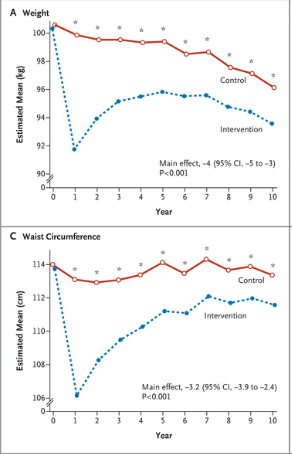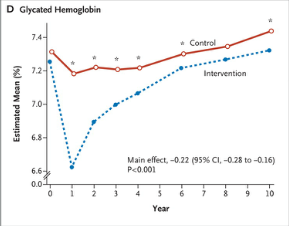Type 2 diabetes is a condition characterised by generally raised levels of sugar (glucose) in the bloodstream. One of the issues here is the ability of glucose to bind to and damage proteins in the body (glycation), which can increase the risk of a range of complications including nerve damage, eye damage, kidney disease and cardiovascular conditions such as heart attacks and strokes.
Diabetics are generally advised to moderate their weight and take regular exercise. A huge study has tested the effectiveness of this advice in terms of its ability to reduce the risk of heart attacks and strokes, and the results were published this week [1]. See here for the full text of the article.
Before we look at the results, let’s look at how the study was set up.
5,145 overweight and obese type 2 diabetic were randomised to receive counselling and support regarding diet and exercise (the ‘treatment’ group), or regular diabetes education and counselling. Those in the treatment group were asked to exercise at moderate intensity for at least 175 minutes each week. With regard to diet, they were to aim at an intake of 1,200-1,800 calories a day, and that the diet should contain (as a percentage of calories) less than 30 per cent fat and at least 15 per cent protein.
Individuals were followed for up to 13½ years, but the average follow up was 9½ years. At the end of the study, the average weight loss was about 6 kg in the treatment group and about 3.5 kg in the control group. The main aim of this study, remember, was to assess the effect on risk of heart attack and stroke. Unfortunately, no benefits were seen here at all compared to the control group.
Here are the changes in weight and waist circumference seen in the treatment (blue) and control (red) groups over the course of the study.
Take a look at this next graph, which charts levels of ‘glycated haemoglobin’ (also known as ‘HbA1c’). This measure gives us an indication of overall blood sugar control over the preceding 3 months or so.
After an initial fall, HbA1c levels gradually climb again and end up essentially where they started.
While a 6 kg weight loss looks good on the scales, if this didn’t come from fat (and perhaps came more from muscle) and if blood sugar control did not improve then perhaps we should not be too surprised that the intervention did not work to reduce the risk of heart attacks and strokes.
What might explain these duff results?
Lots of things, potentially, but one thing that sticks out to me is the dietary intervention deployed here. Essentially, what we have here is a reduced calorie, low-fat diet.
The issue with such a diet is that it will, almost inevitably, cause individuals to put more emphasis on carbohydrate rich foods. In fact, as a general rule, diabetics are often advised to base their diet on carbohydrate including starchy carbohydrates. But it’s a plain and simple fact that starch is essentially made up of glucose molecules, and many starchy foods are, weight for weight, about as disruptive to blood sugar levels as table sugar (sucrose).
This is not the sort of diet, obviously, that is likely to work well for improved blood sugar control (or weight loss, I think). I don’t rate the chances of such a diet to stave off diabetic complications, either.
At one point, the authors question whether the weight loss achieved in the treatment group was enough to yield benefit. They go on to add, though: “However, our trial was planned to test the effects of an intensive lifestyle intervention, and the weight loss achieved in the intervention group is representative of the best that has been achieved with current lifestyle approaches.”
I feel we’re being sold short here. My experience in practice is that low-fat diets (such as the one recommended here) do indeed give modest or insignificant weight loss results, but those lower in carbohydrate (and less restricted in fat) very often lead to substantial weight loss and significantly improved blood sugar control in type 2 diabetics.
I scoured the paper to see if at any point it occurred to the authors that the prescribed diet might actually be the explanation for the poor results found in this study. I was disappointed, though: not only was this idea not mooted, there was not even one single reference to carbohydrate in the whole study. There’s not a single reference to sugar or starch, either.
Diabetes is essentially a problem of carbohydrate intolerance. This huge, multimillion dollar study assessed the impact of lifestyle interventions including diet on diabetics. Quite how the write-up of this study managed to omit any reference to carbohydrate at all is anyone’s guess. But there you have it.
References:
1. The Look AHEAD Research Group. Cardiovascular Effects of Intensive Lifestyle Intervention in Type 2 Diabetes. NEJM epub 24 June 2013 [hr]
[box style=”rounded” border=”full”]
Dr John Briffa’s best-selling ESCAPE THE DIET TRAP – lose weight without calorie-counting, extensive exercise or hunger is available in the UK and US
“This magnificent book provides the scientific basis and practical solutions to liberate you from yo-yo dieting and allow you to achieve sustained weight loss and enhanced health with ease.”
William Davis MD – #1 New York Times bestselling author of Wheat Belly
To read some of the dozens of 5-star reviews for this book [button link=”http://www.drbriffa.com/amazon-reviews-for-escape-the-diet-trap/” color=”silver” text=”dark” window=”yes”]click here[/button]
To buy a paperback copy of the book from amazon.co.uk [button link=”http://www.amazon.co.uk/Escape-Diet-Trap-John-Briffa/dp/0007447760/ref=tmm_pap_title_0?ie=UTF8&qid=1324815918&sr=1-1″ color=”orange” window=”yes”]click here[/button]
To buy a kindle version of the book from amazon.co.uk [button link=”http://www.amazon.co.uk/Escape-the-Diet-Trap-ebook/dp/B005ODY0RW/ref=tmm_kin_title_0?ie=UTF8&qid=1324815918&sr=1-1″ color=”orange” window=”yes”]click here[/button]

To buy a print copy of the book from amazon.com [button link=”http://www.amazon.com/Escape-Diet-Trap-calorie-counting-extensive/dp/0957581602/” color=”orange” window=”yes”]click here[/button]

To buy the kindle version of the book from amazon.com [button link=”http://www.amazon.com/dp/B00BLQ40QM” color=”orange” window=”yes”]click here[/button]
[/box]

